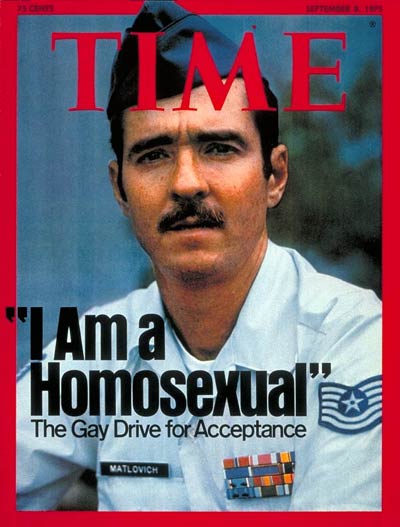The Story Behind This Stone
Technical Sergeant Leonard P. Matlovich (July 6, 1943 – June 22, 1988)[1] was a Vietnam War veteran, race relations instructor, and recipient of the Purple Heart and the Bronze Star.[2]
Matlovich was the first gay service member to purposely out himself to the military to fight their ban on gays, and perhaps the best-known gay man in America in the 1970s next to Harvey Milk. His fight to stay in the United States Air Force after coming out of the closet became a cause célèbre around which the gay community rallied. His case resulted in articles in newspapers and magazines throughout the country, numerous television interviews, and a television movie on NBC. His photograph appeared on the cover of the September 8, 1975, issue of Time magazine, making him a symbol for thousands of gay and lesbian servicemembers and gay people generally.[3][4][5][6] Matlovich was the first openly gay person to appear on the cover of a U.S. newsmagazine.[7] According to author Randy Shilts, “It marked the first time the young gay movement had made the cover of a major newsweekly. To a movement still struggling for legitimacy, the event was a major turning point.” [8] In October 2006, Matlovich was honored by LGBT History Month as a leader in the history of the LGBT community. VIA WIKIPEDIA
Despite his deteriorating health, he tearfully made his last public speech on May 7, 1988 in front of the California State Capitol during the March on Sacramento for Gay and Lesbian Rights:
…And I want you to look at the flag, our rainbow flag, and I want you to look at it with pride in your heart, because we too have a dream. And what is our dream? Ours is more than an American dream. It’s a universal dream. Because in South Africa, we’re black and white, and in Northern Ireland, we’re Protestant and Catholic, and in Israel we’re Jew and Muslim. And our mission is to reach out and teach people to love, and not to hate. And you know the reality of the situation is that before we as an individual meet, the only thing we have in common is our sexuality. And in the AIDS crisis – and I have AIDS – and in the AIDS crisis, if there is any one word that describes our community’s reaction to AIDS, that word is love, love, love.


